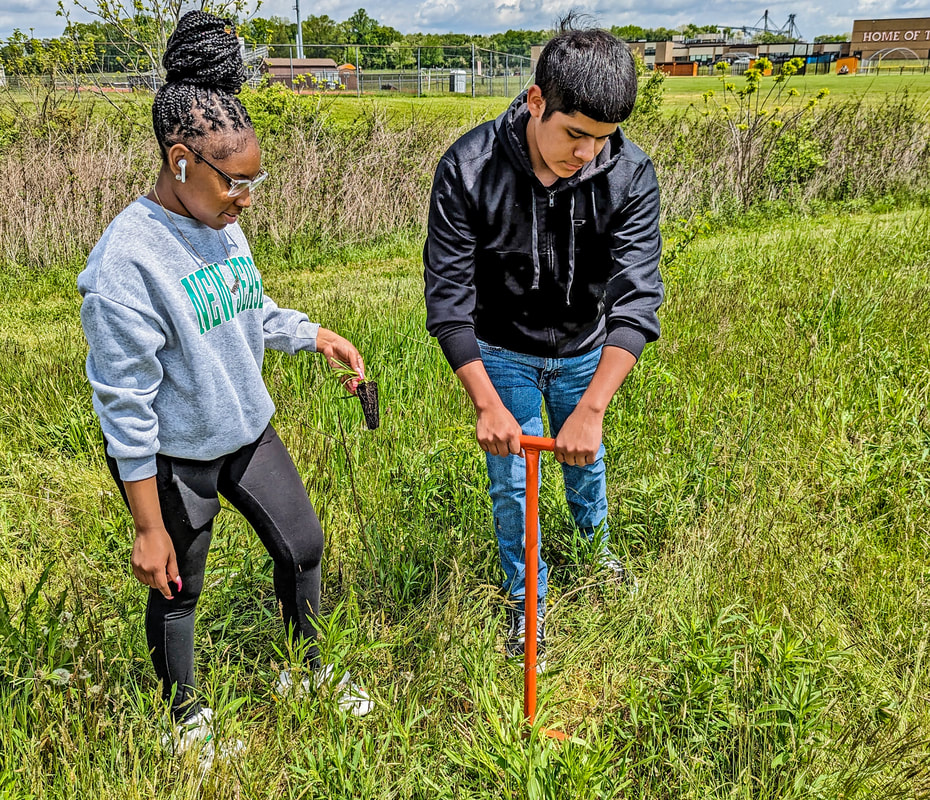|
This Spring, 9th and 10th grade students in Agriculture, Food, and Natural Resources classes at Bridgeton, NJ's Cumberland Regional High School (CRHS) planted 1000 native pollinator plants, creating a 1-acre pollinator habitat on their school grounds. The project, called Helping Pollinators Help Us: Creating Habitat for Climate Change Resilience, launched in the Fall of 2022 with funding from National Oceanic and Atmospheric Administration (NOAA) Planet Stewards, led by Michelle Rebilas, Littoral Society’s Director of Education and Nicole Smith, CRHS Agriculture Teacher and Agriculture Sciences Academy Leader. In the Helping Pollinators Help Us program, students became the conservationists as they learned about the threats to pollinators in the face of climate change and developed a strategy to increase pollinator habitat availability and connectivity on their school campus. The creation of the pollinator habitat was a part of a 2-year project that will engage over 120 students in conservation action in their local community. For the first phase of the program, students studied the importance of pollinators and their vital role in food/agriculture and natural resources. They also learned about the decline of pollinators in the United States due to habitat fragmentation, habitat loss and climate change. Next students planted 300 native plant plugs into pint size pots to care for in their school greenhouse throughout the semester in preparation for their pollinator habitat installation. The second phase of the project was data collection and habitat planning. Students conducted a survey of the proposed pollinator habitat site to determine the species abundance and diversity prior to the habitat installation. Based on their findings, students made predictions about the needs and benefits of increased pollinator habitat on school grounds. Next students conducted a soil analysis in the proposed habitat site to determine soil conditions such as soil texture, moisture, and ph. Students used this information to inform their list of native plants that would thrive in their future pollinator habitat. In the greenhouse, students measured the growth of their plants to calculate growth and survival rate. In May 2023, students planted a total of 1000 native plants, including approximately 250 they had grown themselves in the greenhouse, on an acre of land at Cumberland Regional High School’s campus to create their new pollinator habitat. The native species included brown-eyed Susan, milkweed, purple coneflower, wild bergamot, blazing star, seaside goldenrod, blanket flower, ink berry, butterfly weed and more! To celebrate their efforts, students embarked on a field trip to Barrett’s Run Nature Preserve in Hopewell Twp, NJ to enjoy a nature hike, splash through a muddy stream, and continue their conservation action by planting 100 more native plants in the preserve. The goal of Helping Pollinators Help Us is to engage students in hands-on conservation and stewardship experiences that build skills and confidence in their individual and collective ability to make a difference in the community and for their future. The next steps of this project are to continue to engage students, grades 9-12, in the on-going environmental stewardship project at Cumberland Regional High School through Spring of 2024. NOAA Planet Stewards is a national program providing resources to educators so they can build scientifically literate communities and engage in stewardship activities in response to environmental challenges. Learn more about NOAA educational programs on their website. Comments are closed.
|
Archives
July 2024
Categories
All
|


